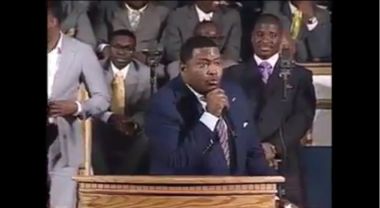Homosexuality: Can a single YouTube sermon change conservative minds?

Sometimes an uptight, over-intellectual, white English preacher looks at his black American counterpart and thinks, where did I go wrong?
I know, I know: it's not as straightforward as that, and there are lots of black American preachers who'd come to my church and fit right in. But just go with the shorthand for a moment and watch the YouTube video of E Dewey Smith, pastor of House of Hope in Georgia.
In just under five minutes of homiletical heaven he blasts those who judge and condemn gay people for their hypocrisy.
He roasts congregations who "don't say anything about the gay choir director because he's good for business". "What are we going to do about the people who've been born this way? Go find every song written by a gay person last 20 years and don't sing it in church. Let's see how many songs you can minister on that Sunday."
"We have done what the slave master did to us," he said. "Dehumanise us, degrade us, demonise us, but then use them for our advantage."
Smith says: "You quote homosexuality is an abomination – from Leviticus. You say that right after you ate some shrimp, some catfish and some lobster. You quote Leviticus while you wearing a wool blend suit. It's also in Leviticus that you shouldn't wear mixed linens."
And, he says: "Here's my point. We pick and choose the scriptures that we want to use to beat folk up with, rather than look at our own lives."
Other great lines include: "You cannot insult and inspire the people you insult"; "You can't evangelise and antagonise at the same time"; "Look at your neighbour and tell your neighbour, 'I don't condemn you. I don't judge you. I will preach Christ to you.'"
The video was an instant success, chalking up more than 300,000 views since it was posted last Thursday. And that's interesting – but why did it get so much traction, and what does that really signify?
1. It's been watched so often because it's a great piece of oratory. You don't have to agree with it to recognise power, passion and conviction. Dewey Smith is a high-volume preacher, but he's not just a ranter: this is the gospel on fire.
2. He's putting a message of inclusivity into the language of a community not generally associated with it. That Pentecostal holiness tradition is socially conservative, and one reason for Smith's shock value is that he doesn't use the language of condemnation.
3. However: he calls out the Church for its hypocrisy, but he doesn't say in so many words that homosexual practice is acceptable – though his comparison of the prohibition against such acts in Leviticus with its prohibition of eating shellfish implies an equivalence. His point is more that "We all need Jesus." (Here's another great line: "Bishop, don't tell me what the Bible says about homosexuals when you change wives like we change underwear. Sit your hypocritical self down.")
4. Many comments on the YouTube clip are from people who say they aren't believers, but they like what they hear. One, 'GlamazonBarbie', says: "I'm an atheist but I'd go to his church just to hear more of that." On the other hand, 'Preacher Ken Jones' wrote: "Pastor Smith horribly misused Leviticus here and it brings to question the quality of his study on the matter." It's fair to say that while shots of his congregation show many clearly enthusiastic about what they're hearing, others look distinctly grim.
So is this a sermon that moves the debate about homosexuality and the Church forward? No, and maybe. Its use of the shellfish argument is questionable, because there's a difference between laws that mark out Jews as Jews and laws with a more general moral application. The "clobber texts" of Leviticus and Romans have been debated ad nauseam and there is nothing new to be said.
What it may do is convince some people that they are starting from the wrong place: the rightness or otherwise of particular actions, instead of the grace of God.
In Henry Mitchell's classic book Black Preaching, he says: "When Black preachers are most persuasive, they are apt to seem more to plead out of passion than to argue out of logic. They seek to guide the hearers in an experience, rather than to overwhelm them with intellectual evidence, even though they may use it well."
This is exactly what Smith's sermon does. He shows what it's like to be overwhelmed by a conviction of grace, and guides his congregation into the same experience. It doesn't answer the sort of questions beloved by denominational doctrine commissions. But it's a fine ripost to those who use the language of rejection, hatred and judgment and dare to call it Christian.
Follow @RevMarkWoods on Twitter.











